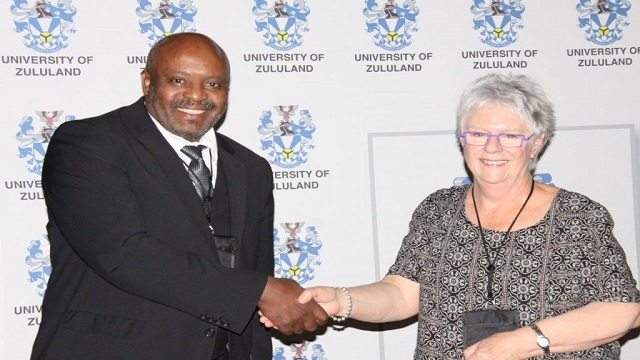
After the success of its 2016 Teaching and Learning Conference, the University of Zululand one again held this significant conference with a focus on “Africanisation of Teaching and Learning: Creativity, Innovation, Invention, Information and Communication Technologies and student participation”.
The conference- which was held over three days- acknowledges the critical importance of national debates on Africanisation and or decolonisation of higher education; a debate which has been significant and topical since the 2015 #feesmustfall movement.
Presenters at the conference framed and focused their presentations to highlight UNIZULU’s historically predominantly disadvantaged background. Dr Yasmin Rugbeer, the Director in the Vice-Chancellor’s Office at UNIZULU, gave an opening address on behalf of the Vice-Chancellor, Professor Xoliswa Mtose, saying that “the University has made significant strides in realising its vision of becoming a leading comprehensive university providing quality education and wishes to cast its attention on curriculum transformation within the African context”.
“Africanisation is seen as an approach of surpassing individual identities in a quest for cohesion as well as a way of acknowledging and accepting ‘otherness’. Africanisation can be understood as the adaptation of the subject matter and teaching methods geared to the physical and cultural realities of the cultural environment. By doing this, we might be able to form an association with the broader African experience and this would assist us in the designing curricula that knit us together. The institution will now focus on curriculum transformation within the African context. We need to develop meaningful curricula,” said Dr Rugbeer, adding “The student voice cannot be disregarded. We are all here to share our experiences and our approaches on how we make the student experience meaningful and relevant to our African context”.
Sibusiso Mchunu, the Dean of Students at the University, spoke about the “Advantages of a Co-curricular Programme for Students”, saying that students are partners in the learning process and they don’t enrol into higher education for academics only. “Learning is not merely an academic pursuit. The whole university environment should be a learning environment. The greatest impact appears to stem from reinforcing academic interpersonal involvement that are relevant to the particular educational outcome,” he said.
Professor Sandile Songca, Deputy Vice-Chancellor: Teaching and Learning at the University invited academics “to start activities that will reflect on their teaching”. “We can’t take our teaching for granted as if it is business as usual. It is a space for innovation. We need to start doing things better and differently. Student also need to come forward and take part in their learning,” he said.
